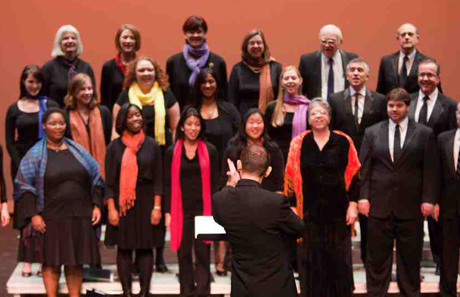
Register by October 17 to Secure Your Spot!
| Registration Type | Member Price |
|---|---|
| Early Bird Registration (Sept. 11-Oct.3) | $750 |
| General Registration (Oct. 4-Oct.17) | $850 |
| Registration Type | Member Price |
|---|---|
| Early Bird Registration (Sept. 11-Oct.3) | $750 |
| General Registration (Oct. 4-Oct.17) | $850 |
| Registration Type | Member Price | Non-Member Price |
|---|---|---|
| Early Bird Registration (Sept. 11-Oct. 3) | $750 | $850 |
| General Registration (Oct. 4-Oct.17) | $850 | $950 |
Not a member? We'd love to have you join us for this event and become part of the Chorus America community! Visit our membership page to learn more, and feel free to contact us with any questions at [email protected].
| Registration Type | Non-Member Price |
|---|---|
| Early Bird Registration (Sept. 11-Oct. 3) | $850 |
| General Registration (Oct. 4-Oct.17) | $950 |
Think you should be logged in to a member account? Make sure the email address you used to login is the same as what appears on your membership information. Have questions? Email us at [email protected].
| Registration Type | Price |
|---|---|
| Individual Session | $30 each |
| All Four (4) Sessions | $110 |
*Replays with captioning will remain available for registrants to watch until November 1, 11:59pm EDT.
Member Professional Development Days are specially designed for Chorus America members. If you're not currently a member, we'd love to welcome you to this event, and into the Chorus America community! Visit our membership page to learn more about becoming a member of Chorus America, and please don't hesitate to reach out to us with any questions at [email protected].
| Registration Type | Price |
|---|---|
| Individual Session | $30 each |
| All Four (4) Sessions | $110 |
*Replays with captioning will remain available for registrants to watch until November 1, 11:59pm EDT.
| Registration Type | Price |
|---|---|
| Individual Session | $30 each |
| All Four (4) Sessions | $110 |
*Replays with captioning will remain available for registrants to watch until November 1, 11:59pm EDT.
Member Professional Development Days are specially designed for Chorus America members. If you're not currently a member, we'd love to welcome you to this event, and into the Chorus America community! Visit our membership page to learn more about becoming a member of Chorus America, and please don't hesitate to reach out to us with any questions at [email protected].

The experience of several professional core choruses demonstrates there are ways to gracefully handle the inherent tension that arises when paid singers are brought on board in a mostly volunteer ensemble. Here are eight tips from managers, conductors, and volunteer singers who have been through this process.
“We are careful to celebrate the contributions of all of our singers, paid or not,” says Bob Peskin, executive director of the Minnesota Chorale. “Both categories know the organization couldn’t be what it is without the other.”
Treat everyone equally when it comes to the length of rehearsals and breaks. “I am very careful to end at the end time—even though some volunteers might not mind going over,” says Betsy Burleigh, artistic director of the Providence Singers. Conductors also tell their singers ahead of time what pieces they’ll be rehearsing, and distribute schedules as much as a year in advance.
Outline the requirements in a chorus handbook. For example, Tom Hall, artistic director of the Baltimore Choral Arts Society, states in his chorus’s handbook that everyone must come prepared, everyone auditions or re-auditions every year, and no one pays dues. “The only time a difference is obvious is when we sign timesheets,” says one of his longtime professionals, John Cain.
Hall and Burleigh do not ask professionals to coach volunteers. “Working with peers is tricky,” Burleigh feels. Nonetheless, other chorus leaders identify coaching as a selling point in their choruses. “The choir responded quite positively,” says Karen Thomas, artistic director of Seattle Pro Musica, but she doesn’t require that support for volunteers who show her they don’t need it.
Joyce Kling, a volunteer singer, says both volunteers and professionals sit on the Seattle Choral Company‘s committees and help out with the annual auction.
Early on, when the only professionals in the Baltimore Choral Arts Society were tenors and basses, Cain says “women in the group felt it might be a little unfair that they weren’t offered the same opportunity.” But his wife JoAnn, a volunteer member, believes it was never a source of tension.
Kling and JoAnn Cain both expressed feelings about this issue. Cain says she did not expect to solo at the time she joined the chorus seven years ago, but now that she’s had the opportunity she says she would be saddened if it were to disappear.
Some organizations have formed chorus councils through which members can anonymously express concerns to the conductor. In some, the chorus is represented on the board. Seattle Pro Musica conducts an anonymous end-of-year survey, Thomas says. “Our feedback loop is very strong and very open, and because of that we can communicate far in advance and anticipate potential problems.”